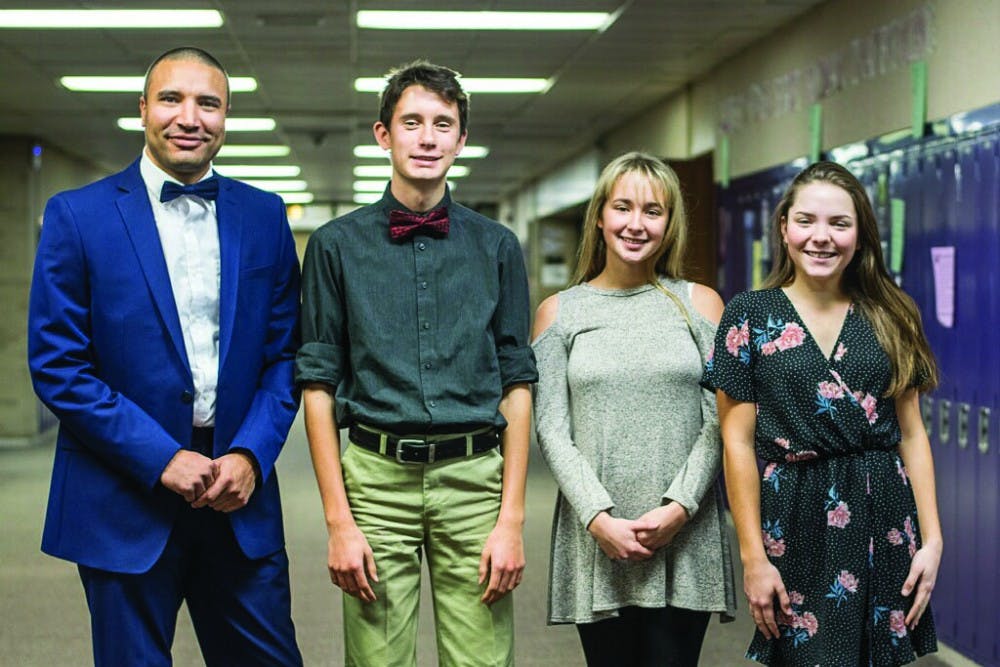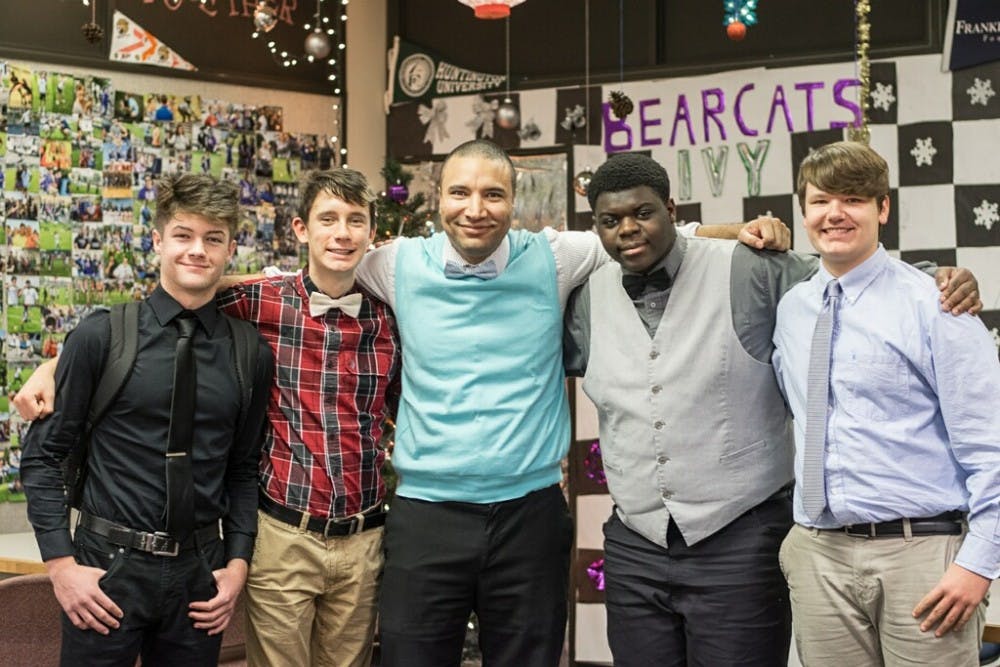According to the National Human Trafficking Hotline’s website, it has received 2,245 contacts — phone calls, texts, online chats, emails, and webforms — that reference Indiana since 2007. 765 victims were involved in cases with “high-level” indicators of human trafficking, and 825 victims were in “moderate-level” cases.
After his middle school science teacher in Los Angeles hosted survivors of human trafficking in class, Muncie Central High School (MCHS) junior Sam Voss said he was motivated to help those who have been through such "horrific, awful crimes" and were "treated as nothing."
“It kind of just broke my heart,” Voss said.
When Voss and his family moved to Muncie in July 2017, he decided to continue showing his support by implementing a social movement called Dressember from Los Angeles into the Muncie community to draw attention to the issue of human trafficking and help its survivors.
“I do it because there’s a lot of injustice in the world, and it causes a lot of pain and a lot of hurt,” Voss said. “Just the knowledge that there are people who are going through horrible, horrible things in Muncie and Indiana and a lot of people don’t know about it … that was kind of my drive.”
His motivation
At his middle school in Los Angeles, Voss and his classmates would take part in “lighthouse projects,” where they were required to choose an event to help raise awareness for a cause in the community.
Voss’ group chose to raise awareness about human trafficking through Dressember. Voss said they chose this movement because the group’s leader went to church with the founder of Dressember, Blythe Hill.

Voss and three other sixth grade boys wanted to participate in Dressember as well, so they decided to wear ties or bow ties for the month, calling their contribution “Bowcember.”
According to Dressember’s website, thousands of advocates globally wear a dress or tie to serve as “the conversation starter to educate [the] community about modern slavery.”
With help from Khalid Reichard, early college coordinator at MCHS, and several student volunteers, Voss said he was able to organize his first Dressember event at MCHS in 2018.
The fall 2018 Dressember event raised $1,903, according to Voss’ post-event report. 480 students from Muncie Central Schools (MCS) also dressed up on “Freedom Friday,” which was another fundraiser to bring attention to the cause.
The money raised helped fund TRU Harbor, a program operated by the Youth Opportunity Center (YOC), which provides shelter for commercially sexually exploited children and sex trafficking survivors.

Human trafficking today in Muncie
Another person who helped Voss during his 2018 campaign was WaTasha Barnes Griffin, MCS Board member and CEO of YWCA Central Indiana.
Barnes Griffin and Reichard delivered presentations to MCHS students about human trafficking.
“We tried to make it be true to life — like how it could affect you here locally and things to be aware of,” Barnes Griffin said.
Barnes Griffin also said the YWCA works with many community members and leaders to advocate for women's rights and freedoms. The YWCA offers an emergency shelter program, and it also partners with Delaware County Circuit Judge Kimberly Dowling as part of a multidisciplinary collaborative committee on human trafficking.
The committee discusses ways to bring awareness and eleminate sex trafficking in local communities and includes representatives from organizations including shelter providers, the Department of Child Services, the juvenile court system, sexual assault nurse examiners from IU Health and TRU Harbor.
“[Human trafficking] is more common than you see,” Barnes Griffin said. “If we have the need to build a service center for young women [TRU Harbor] … then that is a clear indication that trafficking is actually happening here in Delaware County.”
Barnes Griffin said trafficking in Muncie and Delaware County is a “dark underworld” that is “very secretive.”
“We see individuals who come to us — young women 18 to 22, even women with children under 18,” she said. “They come with nothing. They don’t have any dollars — they need money, so they find themselves doing things to get those resources … Some would see that as some kind of prostitution, when the reality is, ‘I’m doing what I need to do to survive, not necessarily that I want to do this.’”
Barnes Griffin said some women come to the YWCA from different states, but the facility can recognize some indicators that the women are being trafficked.
“Pimps often send spotters into shelters to look for vulnerable folks they can pull into that traffic world,” Barnes Griffin said.
Other ways traffickers spot vulnerable young women include bus stops and malls – where traffickers use young teenage boys to entice young women into relationships, only to be trafficked by an adult later – and through online channels like social media apps and websites used by traffickers to chat with teenagers.
“People say that doesn’t happen in Muncie, but it does,” she said. “These kids are getting involved in things that they think are innocent, and they are not.”
The future
Voss said the Ball State and Muncie community can also help raise awareness about human trafficking with its own Dressember campaign or “Freedom Friday” event.
“A lot of times, we get caught up in our own lives that we fail to see things in our world that really affect other people’s lives,” Voss said. “The biggest goal of Dressember is also just catching people’s eyes up to see the world is kind of a bigger place, and it’s also a place that a lot of good happens, but also, there’s a lot of bad things that can happen.
“That’s why we need people to step up and help …[and] make a difference in these problems that are prevalent throughout our community, throughout our society and throughout our world.”
Contact Rohith Rao with comments at rprao@bsu.edu or on Twitter @RaoReports.





